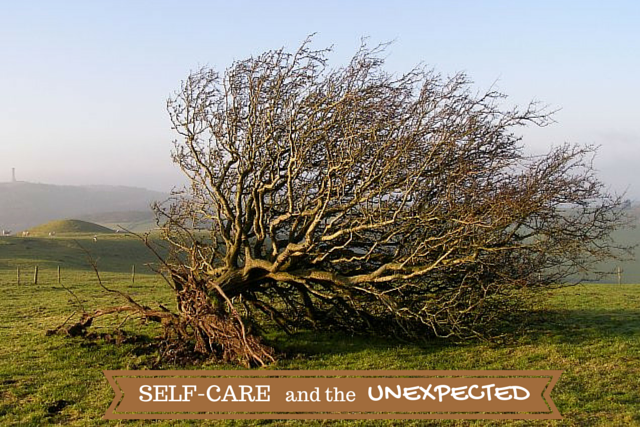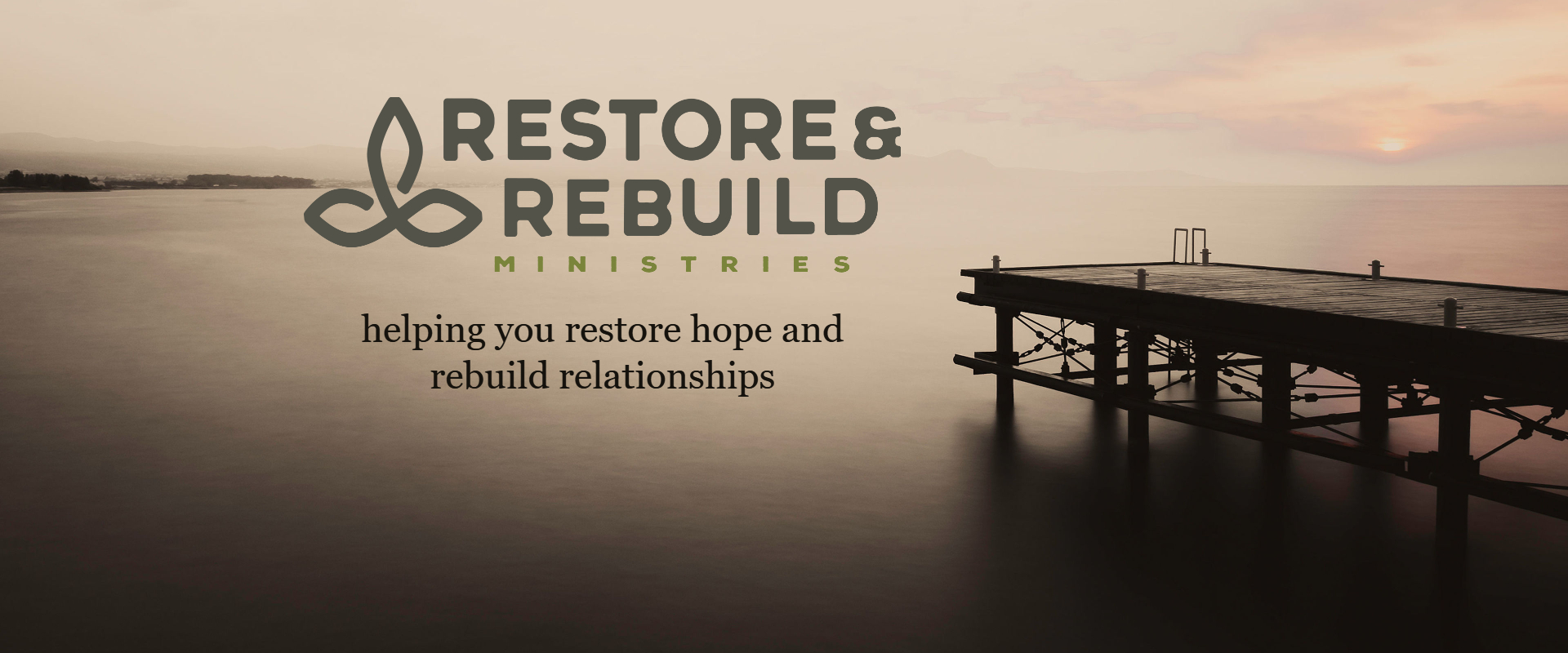How do you take care of yourself when life throws you a curve ball? What does it mean to practice healthy self-care when you’re injured or unemployed, or when you’ve just received very bad news? How can we tend to the needs of our soul when we’ve just been jolted out of our comfort zone?

There I was, stunned, sitting in my smashed-up car in the carpool lane, trying to collect my thoughts. Eventually I regrouped, made it across five lanes of traffic to the freeway shoulder, exchanged information with the other drivers, and called my in-laws, who helped me get my aching body and damaged car back home. I ended up with whiplash and a mild concussion, probably caused by my head ricocheting off the headrest at impact. Repairs to the car cost over six thousand dollars.
I feel very, very grateful it wasn’t worse. No deaths, no injuries requiring an ambulance. Everyone involved had insurance, and the insurance of the man who hit me quickly agreed to pay for all repairs and medical bills.
One month post-accident, I am substantially better. My back and neck still hurt at times, and I tire more quickly than I used to, but I am mostly back to my pre-accident schedule. My car is repaired, and I’ve even driven it on the freeway again. In many ways, I feel very fortunate.
But it has still been a difficult month, a month of persistent fatigue and headaches, a month of good days and bad days, a month of fragility and tearfulness, a month of back pain and chiropractor visits, a month of both gratitude and discouragement. A month of letting my husband take care of me. A month of learning my own limits.
And it’s gotten me thinking about what healthy self-care looks like when we’re dealing with the unexpected. How can we care for ourselves in times like these?
1) Give Yourself Both Nurturing and Limits
Healthy self-care involves both nurturing and limits. Children need their parents to give them lots of love, compassion and nurturing as well as lots of healthy limits, discipline and boundaries. We need the same. Healthy nurturing + healthy limits = good self-care.
Nurturing without limits isn’t really self-care, it’s self-indulgence. And limits without nurturing isn’t really self-care, it’s self-neglect. Nurturing and limits go together — they’re two sides of the same coin of healthy care.
I had to learn this again after my accident. I tend to be a person who tries to “push it through.” If I can, I’ll ignore a mild headache or a tired feeling and press forward with my plans. It was hard to discover that with a head injury, that strategy did not work. When I tried to push it through and go to a meeting despite my fatigue or continue reading despite a headache, I only made things worse and ended up exhausted and discouraged. I found that in my attempts to be disciplined, I was actually neglecting my body’s needs and not practicing healthy self-care. It’s been a process, but I’m learning to notice the early signs that I need a break and take them seriously.
On the flip side, sometimes I’ve gone too far in the other direction and slipped into self-indulgence. You’re still recovering, the voice in my head tells me, if you feel like eating chocolate then go ahead. I don’t give myself the limits that I truly need and I indulge in behavior that isn’t good for my body.
2) Focus on the Most Important Goal
Ironically enough, less than a month before my accident, I wrote a post titled “Your Most Important Goal,” in which I said these words:
[T]here is one vitally important goal that we must remember… That goal is to become a better person. Or, from a Christian perspective, to become more like Jesus.
The beauty of this goal, and the reason it is the most important goal we can have, is that no matter what comes our way, we can still work toward this goal. Other, lesser goals can be thwarted by circumstances…
Our other goals can be good ones: to lose weight, to write a book, to quit smoking, or to eat more dinners together as a family. But we are not in control of situations that can come into our lives and derail those goals. We are broken people who live in a broken world filled with other broken people. There are countless possible hardships that could take us by surprise this coming year.
So when those hard times come, when disaster strikes, when you are wounded and stressed and grieving that you can no longer achieve a goal that was so important to you — at those times, remember that no matter what, you can become a better person. No matter what, you can become more like Christ.
Dealing with the fallout of my accident has been hard. My husband and I are still in the early stages of launching our nonprofit. I had goals of writing weekly blog posts, of marketing our counseling center more, and of meeting with potential donors. I didn’t like being unable to make progress toward these goals due to the unexpected blow of being rear-ended. Over and over again, I had to remind myself of the words I had written, that no matter what, God can work in my life to help me become a better person.
While I can’t claim to know all that God might be trying to do in my life, I know that the accident has given me a chance to learn to accept the things I cannot change, and to realize again that I am not God. It has given me the opportunity to be more patient, to complain less, and to humbly receive care from others. These are valuable ways I probably would not have grown had that day one month ago been accident-free.
Good self-care means remembering to focus on the most important goal — the goal of being a better person, the goal of becoming more Christ-like. It means learning self-nurture and self-discipline rather than self-indulgence or self-neglect. It means accepting the unexpected things we cannot change and courageously changing the things we can. It means looking to God for strength and grace and trusting he will provide.
Question: Have you had unexpected situations when healthy self-care has been a challenge? What have you learned? You can leave a comment by clicking here.

Great article. I think EFT (Emotional Freedom Techniques), also called “Tapping”, can do wonders for yourself and others in the same situation. It works for nearly “everything”! There is a great article about it at Dr. Mercola’s site with photos of the tapping points. It works extremely well for people going through any type of pain or struggle.
In June of this last year I was having some pain in my left side. Went to the Drs and did some test throught I had s kidney stone but didn’t. So I had a CT scan and found a tumor and the Dr said your going to lose your left kidney, well I was shocked not what I was prepared to hear. So God found me some great Drs who work together as a team at UC Davis.
Well in Aug I had a surgery to remove my left kidney it was a tumor that they called bladder cancer in the kidney and the tumor was a size of a quarter. So they took my left kidney out and one of 7 lump nodes was bad also. I had no idea ever going thru anything like this much less cancer.
After my 6 weeks of recovery I went right into chemo. The kind of cancer that was on my kidney was very aggressive and could come back, so they wanted to do chemo right away .
But it was a scary thing and God was in control of all things and my last chemo was Dec 1. But I have a peace of all I’ve been thru that I had to totally depend on God so much to get me thru all of this and he has. I go back in April and see both Drs and get another CT scan see how I’m doing and go from there. But he has shown me so many things thru all of
this. I feel stronger in my faith and stronger in prayer. I had so many people praying for me and because of his goodness I’m at where I am today. God is so good.
Wow, Teresa, talk about unexpected hardships! You’ve been through a lot! It’s great to hear your story and how God has given you peace through it all. Thank you for sharing, it’s so encouraging to hear how God works in people’s lives. Keep trusting God and doing your part to care for yourself. I wish you all the best. I pray that God will continue to watch over you and sustain you and give you peace.
Becky, thank you for being so open and transparent. I love your writing! Keep it up and please take good care of yourself. Day by Day!
XOX Julie T.
Thank you, Julie! It helps me to write about the lessons I’m learning — and this has been an important one for me. Thanks for the encouragement!